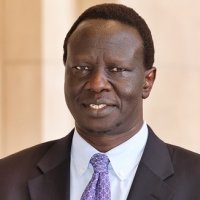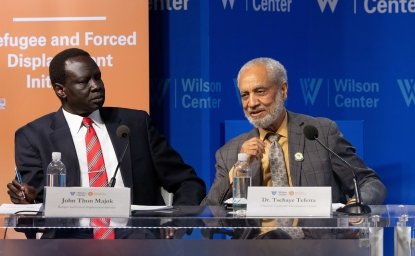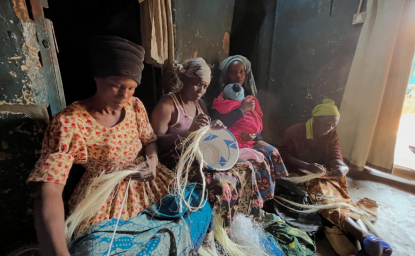As the global community observes World Refugee Day this week against the backdrop of more than 43 million refugees in the world, the current discourse must shift from a narrative that portrays them as passive, vulnerable victims to one that emphasizes their agency and potential.
More than two decades ago, the United States, through its refugee resettlement program, gave me an opportunity to find durable solution after the civil war forced me to flee my home country and spent more than 13 years in refugee camps. In America, I was able to utilize my talents while giving back to the community as a productive citizen.
Yet, the future of 47 million displaced children—including 2 million children born as refugees between 2018 and 2023—is being put on hold. This is a waste of their potential, as they are forced to spend prime years of their lives in limbo in tattered camps or neglected urban areas.
Responding to the plight of more than 117 million displaced people has understandably put pressure on many nations and host communities, causing them to frame displaced people as a burden. But refugees must be identified by their humanity, not their circumstances. In recognizing their strengths, abilities and net contributions, refugees can become a source of inspiration, rather than pity, through their resilience and lived experience.
In Chad, which hosts at least 1.3 million displaced people including refugees from Sudan, one young Sudanese refugee made a positive impact in her host community by teaching literacy skills to children and young people. "They share their lands with us, I share my knowledge with them. I will always remember my time in Chad, and the Chadians will also remember me," says Mouwahib Mahamat Adam who was forced out of college by the ongoing civil war in Sudan to leave her home. Her commitment led the village chief to allocate a piece of cultivable land to her in recognition of her efforts. "Mouwahib has become our sister, and thanks to her, we have increasingly fraternal relations with the refugees. Her commitment has also made us understand that an educated woman can better serve others,” says one host community member.
When Venezuelans fled political and economic crisis in 2015, many sought refuge in Colombia. Instead of marginalizing the Venezuelan migrants and refugees, Bogota granted at least 1.8 million of them a 10-year temporary protection status, allowing them access to schools and social services. Their income increased by 31% as a result, according to a World Bank study. In addition, for the many children enrolled in schools, the stigma associated with being a forced migrant was eased because of this integration policy. “Xenophobia and discrimination used to be practiced there,” one educator said, “but both have significantly decreased.”
After finding safety, many refugees seek education and job opportunities to utilize their talents to become self-sufficient. Uganda provides a telling example of a host country policy that creates an environment for refugee self-reliance. Hosting more than 1.6 million refugees, Uganda grants a plot of land to all households regardless of size. Because the livelihoods of many of these refugees are based on agriculture, they can use their knowledge of farming practices to support themselves. Jordan, which hosts 12% of Syrian refugees, responded by giving them work permits that enabled them to access the formal labor market. This policy swayed domestic perception: “90% of Jordanians believed that Syrians were pushing down wage levels in 2014 compared to only 65% with the same belief in 2020,” the International Labor Organization report shows.
Conflict, persecution, violence, human rights violations or other related factors continue to displace millions from their homes as we currently witness in the Middle East, Sudan, Ukraine, and beyond. While refugees are exposed to the extreme consequences of wars and forced displacement that make them susceptible, their vulnerability is not inability.
When refugees are given a space to unleash their agency, talents, and abilities, society benefits. A new groundbreaking study by the US Department of Health and Human Services Administration shows that refugees and asylees have generated $123.8 billion in net fiscal benefit to the US economy from 2009 to 2019, contributing more tax revenue than they cost the government over this 15-year period. Other research finds that “refugees possess valuable skills and talents that are beneficial to our society,” including an entrepreneurial spirit surpassing that of native-born.
As these examples show, refugees can make a difference when host countries create a policy environment that unlocks their human capability. However, the UN Refugee Agency budget for the cited host countries—Colombia, Uganda, Chad, and Jordan—is 44% funded, on average, leaving a funding shortfall of 56%. This wide gap between the needs and humanitarian response compounds existing vulnerabilities. Funding shortfall means cuts in school funding and food rations for refugees. It means refugee children will go hungry for days and will not attend school.
As part of its responsibility sharing, the global community must financially invest in enabling environments that maximize the potential of refugees and their positive contributions. Providing adequate resources to host countries will help them sustainably integrate refugees and give them opportunities to utilize their talents. Not doing so will risk losing the progress already made.
Policies that recognize the talents of refugees and unlock the potential of displaced children will have a positive impact thereby shaping the narrative. Suppose former refugees like Albert Einstein, Isabelle Allende, Bob Marley and others had been warehoused in camps and denied the opportunities to prosper. Would humanity have ever benefitted from their great minds?
Author


Refugee and Forced Displacement Initiative
The Refugee and Forced Displacement Initiative (RAFDI) provides evidence-based analyses that translate research findings into practice and policy impact. Established in 2022 as a response to an ever-increasing number of people forcibly displaced from their homes by protracted conflicts and persecution, RAFDI aims to expand the space for new perspectives, constructive dialogue and sustainable solutions to inform policies that will improve the future for the displaced people. Read more





